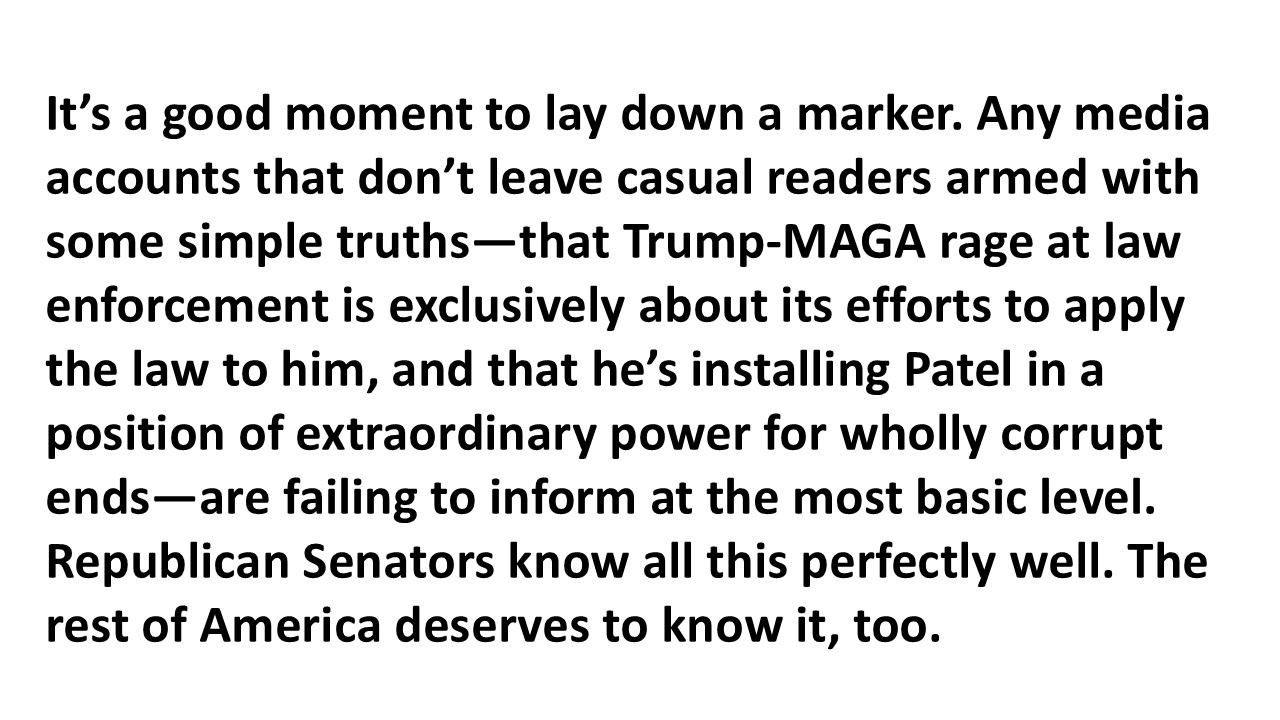How GOP Senators Are Secretly Getting Ready to Surrender to Trump
Trump wants to turn the FBI into something so draconian that the political press many not grasp it until it’s too late. And Republican senators are already giving themselves cover to go along with all of it.
It’s largely passing unnoticed, but Republicans are quietly laying the groundwork to give their full blessing to one of Donald Trump’s more corrupt schemes: Unleashing law enforcement on his political enemies without cause once he’s sworn in again next year. That capitulation is already underway, with an argument they’re beginning to put forward to smooth the path for Trump’s nominee to head the FBI, Kash Patel.
The New York Times has a big piece reporting that Senate Republicans are growing “warm” to Patel, who has explicitly declared that in Trump’s second term, a range of enemies of Trump should be prosecuted for no discernible legal reason whatsoever.
Why are they warming to Patel despite the obvious threat he poses? The Times reports that Republicans now harbor a “deep distrust” of the FBI, that they see it as “rotted by corruption and partisanship,” and that all this has become a new “Republican orthodoxy”:
It is the culmination of a remarkable turnabout that has been years in the making for a party that traditionally had given unyielding support for the nation’s law enforcement agencies.
Senator Markwayne Mullin of Oklahoma claims that Patel will “clean out the FBI.” And Senator Thom Tillis of North Carolina insists he’lll restore the bureau’s “integrity.” In short, we’re meant to believe GOP senators back Patel because he will reform a badly corrupted agency in a way that will better serve our country.
Here’s the thing: All of that is nonsense. Most Republicans don’t actually think those things about the FBI, and they don’t actually believe Trump picked Patel to reform the bureau to address those alleged problems. Nor is there any reason to treat this as any kind of sincere, momentous ideological shift.
We should treat that very idea—that Republicans have in some principled sense begun to deeply question the FBI’s institutional role—as itself being spin. If anything, the GOP embrace of Patel carries echoes of the corrupted, secretive, intrusive FBI of the pre-Watergate days, and the new reformist pose is being hatched as fake cover to support Patel later despite what Republicans all know to be true—that Trump has selected him to transform the agency into a weapon against his enemies.
The evidence for this reading is everywhere. First, Trump already tried to wield law enforcement against political enemies during his first term (do you recall Republicans objecting at the time?) and Trump has explicitly threatened this to a far greater extent this time around. Republicans know all this. Take Senator Joni Ernst of Iowa, who murmured something to The Times about Patel bringing “transparency” to the agency. Do you think Ernst actually believes Trump picked him to realize some sort of substantive, far-reaching vision of reform? Of course she doesn’t.
Second, just look at Patel’s enemies list. Of the 60 names on it, over two-thirds of them are former Trump officials who went public with criticism of him; critics of Trump with prominent media profiles; government officials who carried out their duty to investigate Trump’s malfeasance; high-profile Democratic politicians; or former senior officials under Democratic presidents.
As TNR’s Timothy Noah notes, many of the latter ones are political appointees, so by definition, they are not members of the “deep state.” That’s the permanent, all-powerful bureaucracy that Trump is supposed to be targeting by picking nominees like Patel, giving the move superficial justification. But as this list suggests, Trump wants an FBI director primarily committed to persecuting people for being Democrats or telling the truth about Trump in public.
Third, consider the critique of the FBI from Republicans now pretending Trump wants to genuinely reform the agency. Per The Times:
In recent years, Republicans have attacked the F.B.I. for its role in investigating the Trump campaign’s ties to Russia, including its handling of the so-called Steele dossier; accused officials there of failing to investigate issues surrounding Hunter Biden’s laptop; and slammed its leaders for authorizing a raid of Mr. Trump’s Mar-a-Lago home in pursuit of classified documents.
Note that those allegations all concern alleged mistreatment of—or unfairness to—Trump himself. They, too, are nonsense: While some irregularities did take place during the Russia investigation, they were investigated and exposed by the Justice Department inspector general—as is supposed to happen when the system works as it should—and they fell far short of the systemic corruption MAGA claimed. The Biden Justice Department didn’t exactly refrain from investigating or prosecuting the Biden family. The search of Mar-a-Lago was approved by a judge who was persuaded by hard evidence.
Fourth, MAGA Republicans’ more-recent claims about the “deep state” targeting Trump and MAGA keep collapsing—but Republicans keep pushing them, anyway. The inspector general just released another report finding that the FBI didn’t actually instigate the violence of January 6, 2021, debunking one of MAGA’s biggest conspiracy theories. MAGA Republicans immediately distorted the report’s findings about FBI informants in the crowd (at their own volition) to claim it had confirmed their “false flag” theories, but as Philip Bump of The Washington Post details, it’s just baloney.
None of this is to dismiss good-faith ideas for reforming the FBI and intelligence gathering more broadly. Earlier this year, a bipartisan group of lawmakers hoped to overhaul the law governing warrantless surveillance, which they see as a violation of civil liberties. (It ended up getting reauthorized without reform.) Meanwhile, there’s an argument for tightening or codifying in law Justice Department agency guidelines for the initiating of investigations, says Frank Figliuzzi, a former counterintelligence official for the FBI.
But Trump doesn’t have any genuine interest in any of that. “Generally there are areas where serious discussions could be had about reforming the FBI,” Figliuzzi tells me. “I don’t see any serious discussions coming from the Trump crowd.”
All this gets at another deeply problematic narrative that’s gained traction of late. It’s often argued that Trump’s anger at law enforcement demonstrates that he has adopted a stance that’s fundamentally critical of our institutions, while Democrats have reflexively become their defenders. This helped Trump win amid deep distrust in the system, we’re told.
While there’s a grain of truth to this notion, the whole idea should be handled with extreme caution. Trump and his MAGA allies are angry at law enforcement—but only to the degree that it tried to hold him accountable for his alleged lawbreaking. That’s it. There’s just no serious institutional critique behind any of this.
Meanwhile, Democrats do defend our institutions, but primarily in this sense: By insisting that they have not been profoundly corrupted to unfairly target Trump and MAGA. And they insist Republicans shouldn’t get away with using fake claims of MAGA persecution to pre-justify Trump’s plan to unleash the hounds of law enforcement on MAGA’s enemies, which he’s long intended to do anyway. Democrats defend our institutions against bad-faith attacks designed to facilitate their politicization and manipulation.
The media is about to face a serious stress test. As Slate’s Dahlia Lithwick points out, we may see the FBI become akin to “J. Edgar Hoover on steroids,” but because the implications of this scenario are so immense and jarring, it’s hard to find the language to capture it adequately. Meanwhile, when Republicans close ranks behind Patel, the propaganda will be deafening: Trump is picking Patel to “clean house” and “take on elites.” The temptation will be strong to slot this into a “populist versus the establishment” frame that inadvertently flatters Trump.
It’s a good moment to lay down a marker. Any media accounts that don’t leave casual readers armed with some simple truths—that Trump-MAGA rage at law enforcement is exclusively about its efforts to apply the law to him, and that he’s installing Patel in a position of extraordinary power for wholly corrupt ends—are failing to inform at the most basic level. Republican Senators know all this perfectly well. The rest of America deserves to know it, too.
Greg Sargent is a staff writer at The New Republic and the host of the podcast The Daily Blast. A seasoned political commentator with over two decades of experience, he was a prominent columnist and blogger at The Washington Post from 2010 to 2023 and has worked at Talking Points Memo, New York magazine, and the New York Observer. Greg is also the author of the critically acclaimedbook An Uncivil War: Taking Back Our Democracy in an Age of Disinformation and Thunderdome Politics.




